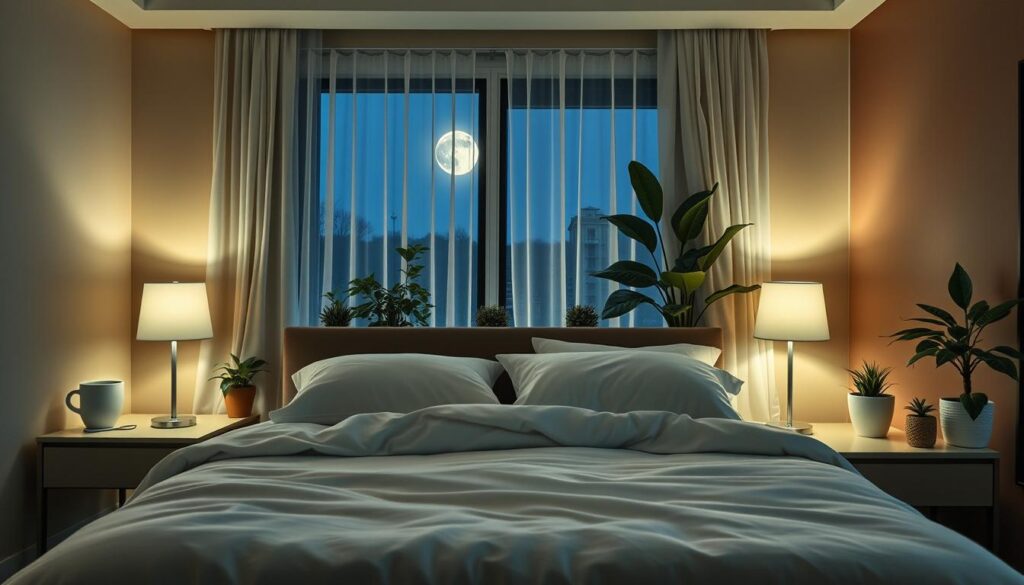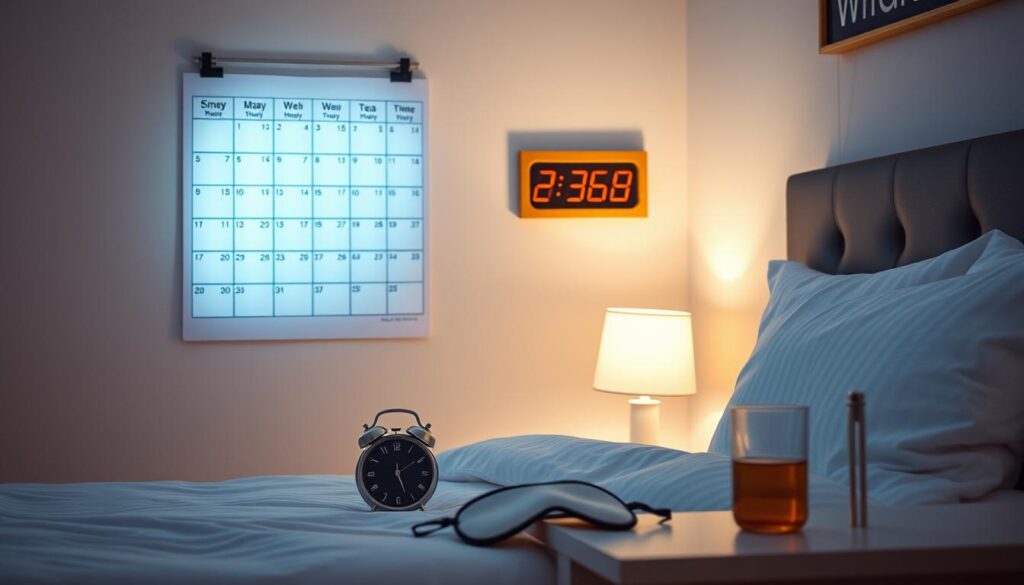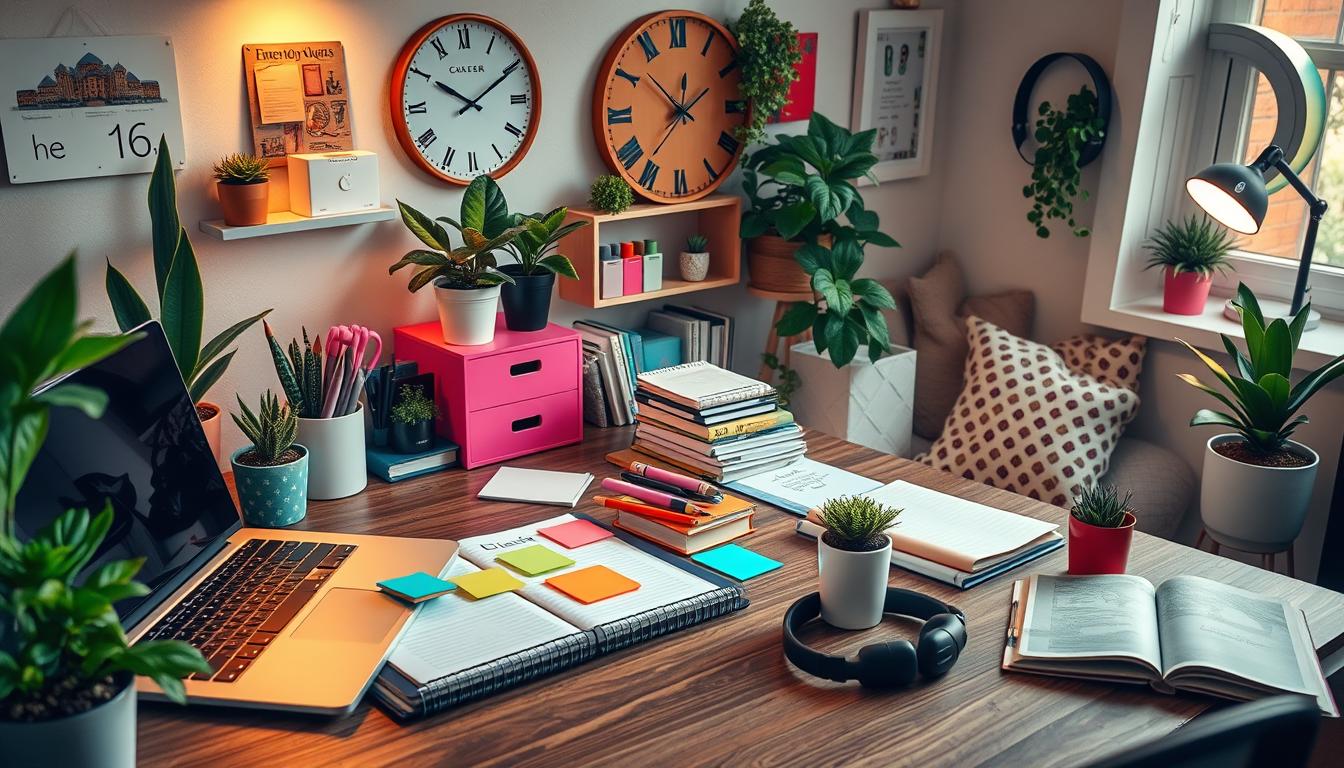Quality sleep is key for good health and happiness. By following healthy sleep habits, people can greatly improve their sleep. Experts say adults should sleep at least seven hours each night. A cool, dark, and quiet room is best for a good night’s sleep.
Poor sleep habits can cause many health problems. These include heart disease, obesity, depression, and dementia. But, there are ways to make your sleep better and your health overall.
Key Takeaways
- Establish a consistent sleep-wake schedule to regulate the body’s circadian rhythm
- Create a relaxing pre-bedtime routine to prepare the mind and body for sleep
- Limit screen time and exposure to blue light in the hours leading up to bedtime
- Engage in regular physical activity to promote better sleep quality
- Adjust dietary habits, such as avoiding heavy meals and caffeine close to bedtime
Understanding Sleep Quality and Its Impact on Health
Sleep is key to our well-being, but many struggle to get good rest. Learning about sleep cycles and the circadian rhythm helps us understand how to sleep better.
The Science Behind Sleep Cycles
Sleep has different stages, like REM and non-REM sleep. These stages repeat all night, with most people going through 4-5 cycles. Scientists have found genes that control sleep, like the “wide awake” gene in fruit flies, humans, and mice.
How Poor Sleep Affects Physical and Mental Well-being
Poor sleep can harm our health a lot. It raises the risk of high blood pressure, heart disease, diabetes, depression, and obesity. Just one night without sleep can make a healthy person pre-diabetic.
The Role of Circadian Rhythm in Sleep Regulation
Circadian rhythms, controlled by our internal clock and light, are vital for sleep. Melatonin, made when it’s dark, helps us sleep. Problems with our circadian rhythm can cause sleep disorders and health issues, like those in the blind.

It’s important to know about sleep stages, the effects of poor sleep, and circadian rhythm. If you can’t sleep well, getting help from a professional might be needed.
Creating the Optimal Sleep Environment
Creating the perfect sleep environment is key for quality rest. Experts say a cool, dark, and quiet bedroom is best. This helps you sleep deeper and wake up feeling better.
Temperature is a big part of a good sleep space. The ideal bedroom temperature is about 65 degrees Fahrenheit. This cooler setting helps your body cool down, which is important for sleep.
To keep the room at this temperature, use blackout curtains or a sleep mask. These block out light that can keep you awake.
- Maintain a bedroom temperature between 60 to 67 degrees Fahrenheit for optimal sleep quality.
- Utilize blackout curtains or a sleep mask to eliminate light exposure, which can disrupt melatonin production.
- Incorporate a white noise machine or earplugs to minimize disruptive sounds and promote a more peaceful sleep environment.
Reducing noise is also crucial. Loud sounds can break up your sleep and make it hard to rest well. To fix this, use a white noise machine or earplugs.
“A quieter bedroom is better for sleep than a louder one, as loud noise disturbances can cause sleep fragmentation and disruption.”
The mattress and bedding also matter a lot. A comfy, supportive mattress and good sheets and pillows can really improve your sleep. Change your bedding often and get a new mattress when it’s old.

By making your sleep space the best it can be, you’ll sleep better. Keep it cool, dark, quiet, and comfy. This will help you sleep better and feel healthier.
Essential Sleep Hygiene Practices for Better Rest
Getting quality sleep is key for your health. Simple sleep hygiene practices can greatly improve your sleep. These include setting a regular sleep schedule, managing screen time, and avoiding blue light before bed. These tips can make you feel refreshed and ready to go in the morning.
Developing a Consistent Sleep Schedule
Keeping a regular sleep schedule is vital. The CDC says adults need 7 to 9 hours of sleep each night. Going to bed and waking up at the same time every day helps your body stay in rhythm. This can also reduce daytime tiredness.
Pre-bedtime Relaxation Techniques
Relaxing before bed is important. Try reading, stretching, or meditation to calm your mind and body. These activities can help you relax and sleep better.
Managing Screen Time and Blue Light Exposure
Electronic devices can make it hard to fall asleep because of blue light. Try to avoid screens for an hour before bed. Use blue light filters on your devices. Doing relaxing activities before bed can also help improve your sleep.
By following these sleep hygiene tips, you can improve your sleep and overall health. Remember, being consistent is important. Stick to a healthy sleep routine that suits you.

| Sleep Hygiene Practice | Recommended Guideline |
|---|---|
| Sleep Duration | 7-9 hours per night for most adults |
| Consistent Sleep Schedule | Go to bed and wake up at the same time every day |
| Pre-bedtime Routine | Engage in relaxing activities like reading, stretching, or meditation |
| Screen Time and Blue Light | Limit exposure for at least 1 hour before bedtime |
| Bedroom Environment | Maintain a cool, dark, and quiet space for sleep |
“A consistent bedtime routine and sleep environment that promotes healthy sleep, known as sleep hygiene, can significantly impact overall well-being.”
Dietary Habits That Influence Sleep Quality
The foods and drinks we choose can greatly affect our sleep. Knowing how diet and sleep are linked is key to good sleep and health.
Caffeine in coffee, tea, and energy drinks can mess with sleep if we have it too close to bedtime. It’s best to avoid caffeine 6-8 hours before you want to sleep. Alcohol might make you sleepy at first but can hurt your sleep quality and wake you up a lot during the night.
Eating big meals before bed can also mess with sleep. This is because your body uses energy to digest food. Instead, choose light snacks that help you sleep, like tart cherry juice, kiwi, and oily fish like salmon.
| Food/Drink | Effect on Sleep Quality |
|---|---|
| Caffeine | Disrupts sleep when consumed too close to bedtime |
| Alcohol | Interferes with sleep quality and can lead to more nighttime awakenings |
| Large, heavy meals | Can hinder sleep as the body’s energy is diverted to the digestive process |
| Tryptophan-rich foods | May promote better sleep |
| Magnesium-rich foods | May support healthy sleep patterns |
| Melatonin-rich foods | Can help regulate the sleep-wake cycle |
Eating well, drinking enough water, and avoiding snacks or big meals late at night can help you sleep better. By knowing how diet affects sleep, we can make choices that help our health and well-being.
Physical Activity and Sleep Quality
Regular physical activity can greatly improve sleep quality. But, when you exercise matters a lot. Moderate exercises like walking or cycling help sleep. But, intense workouts before bed can hurt sleep.
Exercise Timing and Its Impact on Sleep
Experts say to avoid hard exercise 1-2 hours before bed. This lets endorphins drop and the brain relax. Some people find late-night exercise helps them sleep better.
Types of Activities That Promote Better Sleep
- Moderate-intensity aerobic exercises like walking, swimming, or cycling
- Yoga and stretching routines for relaxation before bed
These activities help regulate body temperature and rhythms. They also reduce stress and anxiety, common sleep disruptors.
The Connection Between Movement and Sleep Hormones
Exercise affects sleep hormones like melatonin and cortisol. Regular activity keeps these hormones balanced, leading to better sleep. Aim for 150 minutes of moderate exercise weekly for best sleep benefits.
“Consistency with preferred exercise types is more important than engaging in exhaustive routines when it comes to improving sleep quality.”
Choosing the right exercise at the right time can greatly improve sleep and overall health.
When to Seek Professional Help for Sleep Issues
Good sleep habits can help with many sleep problems. But, if issues keep coming back, it might be a sign of a deeper problem. If sleep troubles are making it hard to get through the day, it’s time to see a doctor.
Healthcare providers can check for sleep disorders like insomnia, sleep apnea, and restless leg syndrome. They use tests, like a sleep study, to find out what’s wrong. Then, they create a plan to help you sleep better.
Ignoring sleep disorders can cause big problems. It can lead to mood swings, anxiety, depression, and even accidents. Getting help from a sleep specialist can fix these issues. They can help you sleep better and feel more awake during the day.















Hairstyles VIP
One other important issue is that if you are an elderly person, travel insurance regarding pensioners is something you must really contemplate. The more aged you are, a lot more at risk you might be for having something bad happen to you while abroad. If you are not covered by several comprehensive insurance coverage, you could have quite a few serious problems. Thanks for expressing your good tips on this blog.